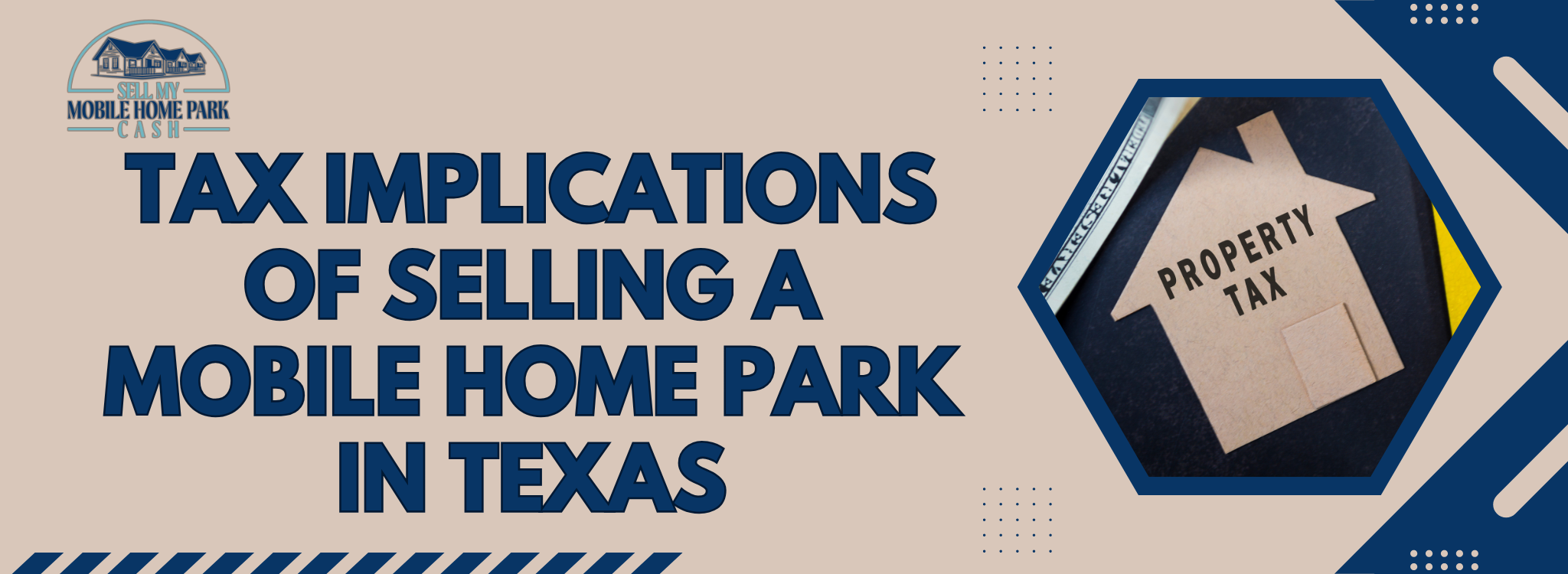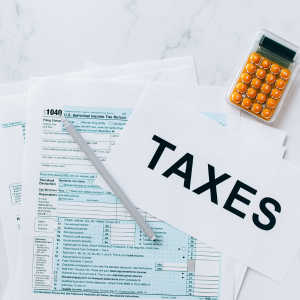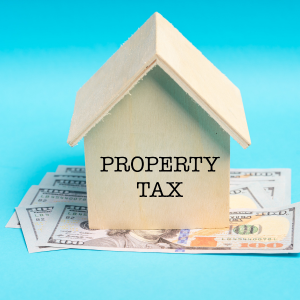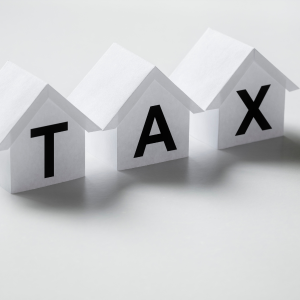
Tax Considerations When Selling a Mobile Home Park in Texas
Selling a mobile home park in Texas can be exciting, but understanding the tax implications is critical. It would be best if you understood the property tax consequences and how mobile home park investment taxes may affect you. Effectively managing tax liabilities in Texas can save you money and worry.
What Taxes Are Applicable to the Sale?

When selling a mobile home park in Texas, you may be required to pay certain taxes. One is the real estate transfer tax. In addition, the sale may generate taxable income, which means you may be required to pay federal taxes on the profits. Understanding how to submit state taxes in Texas will help you stay in compliance.
How Does Capital Gains Tax Affect You?
Selling your park also involves paying capital gains tax. If you make a profit on the transaction, it may impact your financial planning. Knowing and planning for the capital gains tax on mobile homes in Texas will help you minimize these expenses.
Are There Tax Deduction Opportunities?
You can take advantage of several tax deductions to reduce your tax burden in Texas. You may be able to lower the amount you owe from the mobile home park sale by employing tax-efficient tactics and identifying applicable deductions. Planning ahead of time is essential for capitalizing on these chances.
Understanding Depreciation Recapture in Texas

Depreciation recapture is critical to selling a mobile home park in Texas. It entails paying taxes on previously incurred depreciation expenditures. Understanding the tax consequences and prospective tax liabilities is critical to your financial performance.
What Is Depreciation Recapture?
Depreciation recapture occurs when you pay taxes on previous depreciation deductions when selling property. Understanding these factors is critical because they impact your taxable revenue from the sale of your mobile home park.
How Does It Impact Your Tax Liability?
Depreciation recapture can significantly impact your tax liabilities in Texas and the federal taxes you pay when selling your mobile home park. Understanding these elements can help you plan more effectively and prevent unexpected costs.
Strategies to Minimize Its Effect
Tax deferment tactics and other tax efficiency approaches in Texas can help mitigate the impact of depreciation recapture. Investigating these options may help alleviate the financial burden of selling your mobile home park.
1031 Exchange: A Strategy for Deferring Taxes

If you have a mobile home park in Texas and wish to sell, a 1031 exchange can help you delay taxes. This strategy allows you to sell your property and reinvest the proceeds in a comparable one, deferring capital gains taxes. Understanding how 1031 exchanges work allows you to make better decisions and optimize your tax plan.
What Is a 1031 Exchange and How Does It Work?
A 1031 exchange, called after Internal Revenue Code Section 1031, allows you to defer paying capital gains taxes when you sell one investment property and purchase another. In Texas, this is popular among people selling mobile home parks. To qualify, the properties must be “like-kind,” meaning they are similar in nature or use. This method allows sellers to avoid paying taxes immediately, allowing them to reinvest and even grow their capital.
What Are the Benefits and Limitations of Using This Tax Strategy?
A 1031 exchange can help you defer taxes and potentially expand your investment. This can result in significant tax savings in Texas, particularly for high-value properties like mobile home parks. But there are limitations. You must find a new property within 45 days and finish the transaction in 180 days. Not all homes qualify, and mistakes might result in tax payments. Consider these variables before deciding on tax deferment strategies in Texas.
Steps to Execute a Successful 1031 Exchange in Texas
To complete a 1031 exchange, follow these steps:
- Consult a Qualified Intermediary: They handle the exchange process.
- Sell Your Current Property: Make sure the sale is part of a 1031 exchange.
- Identify Replacement Property: Within 45 days, find possible like-kind properties.
- Complete the Exchange: Buy the replacement property within 180 days.
Following these steps helps you follow tax deferment strategies and best practices in Texas.
Estate and Inheritance Tax Planning for Mobile Home Parks

When selling a mobile home park in Texas, it is critical to understand estate and inheritance taxes. Good planning can reduce taxes while increasing the value left to heirs.
How Can Estate Tax Affect Your Property Sale?
The estate tax can significantly impact the amount spent selling a mobile home park. In Texas, estate tax planning is required to cope with potential taxes on property transfers. If the value of your property exceeds the federal exemption level, your estate may be required to pay taxes, which will reduce the amount received by beneficiaries. Trust and estate tax techniques can mitigate this effect, making an easier sale.
What Are Effective Estate Planning Strategies?
Trusts, asset transfers, and the use of life insurance are all part of effective estate planning. In Texas, these approaches can help decrease estate taxes and facilitate asset transfers. Working with experts allows you to create a strategy tailored to your needs, emphasizing estate tax preparation for mobile home parks.
Understanding Inheritance Tax for Mobile Home Parks

Inheritance taxes govern the transfer of assets after a person dies. Texas does not have its inheritance tax, although federal regulations may apply. Understanding how these taxes may affect the transfer of your mobile home park to heirs is critical. Trust and estate tax techniques can help control potential obligations and lower the tax impact on your beneficiaries.
Staying informed and adopting these tax planning guidelines will help you make sound decisions about your mobile home park investments. Whether considering a 1031 exchange or estate tax preparation, these options can help you better your financial situation in Texas.
Federal and State Tax Filing Requirements
Selling a mobile home park means dealing with taxes. You need to know about federal taxes and the rules for state tax filing in Texas. Understanding your income tax considerations in Texas and your legal tax obligations will help you prepare for what’s ahead.
What Federal Tax Regulations Apply to Park Sales?
When you sell a mobile home park, you have to pay federal taxes on mobile home park sales. This affects your taxable income. The IRS has rules about these sales, which show how much tax you owe. Learning these IRS regulations helps you manage your money.
How to Comply with State Tax Filing Obligations in Texas
Texas has specific rules for state tax filing. Knowing your legal tax obligations in Texas is important to following the law. Compliance with tax regulations, especially when selling a mobile home park, helps avoid problems.
Are There Local Tax Regulations Unique to Texas?

Texas has special local tax regulations that can affect property sales. It’s important to know about property tax implications and zoning laws. These things could change the tax impact when you sell a mobile home park in Texas.
Financial Planning and Tax Liability Management
Good financial planning helps when selling a mobile home park in Texas. By understanding your tax liabilities, you can work to lower the tax burden. Planning lets you deal with possible financial effects.
How to Plan Financially for High Tax Liabilities?
High tax liabilities can be tough, but good planning can make it easier. Look at ways to reduce the tax burden to lessen the financial load. Smart financial planning is necessary when selling a mobile home park.
What Role Can a Tax Advisor Play?
A smart tax advisor can be very helpful when selling a mobile home park in Texas. They give expert tax professional consultation to help you with legal tax obligations and improve your financial outcomes.
Maximizing Tax Efficiency in a Mobile Home Park Sale
Selling a mobile home park in Texas can help you save on taxes. You can use special tax efficiency strategies for this state. First, check the effective tax rate for your mobile home park in Texas to plan better. Reducing your tax burden and looking into tax deferment strategies are good ideas, too. Remember the capital gains tax when you sell, as it greatly affects your taxes.
How Can You Reduce Your Effective Tax Rate?
Try lowering the effective tax rate to pay less tax when selling your mobile home park in Texas. Check your taxable income from the sale to find ways to cut your tax liabilities. A tax professional can help find ways to reduce these costs.
What Are the Best Practices for Tax Season Preparation?
When selling a mobile home park in Texas, preparing for tax season is important. Talk to a tax professional so you don’t miss any deductions or credits. Financial planning is key; start early to get all your paperwork in order. This will make paying taxes easier and might save you money.
Utilizing Tax Credits and Shelters for Future Developments

For future mobile home park projects, use tax credits and tax shelters. These give you good tax deduction opportunities in Texas. Planning for these helps lower what you owe in taxes and boosts profits. Keep up with any changes to stay compliant and benefit the most.
The Role of Professional Consultation in Tax Matters
Talking to a tax professional in Texas is smart for dealing with taxes. They ensure you meet all legal tax obligations and offer ways to lessen your tax load. Their knowledge about mobile home park taxes is very helpful and can prevent expensive mistakes.
Why Should You Consult a Tax Professional Before Selling?
Before you sell your mobile home park, chat with a tax advisor in Texas. They help with financial planning and ensure you follow all tax reporting requirements. Their advice can improve your sales plan while keeping you out of trouble.
How Can Legal Advice Support Tax Compliance?
Legal advice is key for meeting tax compliance when you have a mobile home park in Texas. Knowing IRS regulations and following legal tax obligations protects you from audits and fines. Law experts can help you understand tough tax rules, giving you peace of mind.
What to Expect During a Tax Audit Preparation?
Preparing for a tax audit means knowing your duties under Texas law and IRS regulations. Making sure you’re fully tax-compliant is key to an easy audit. Keep your records tidy and work with experts in mobile home park taxes. Their help is crucial in satisfying auditors and clearing up any issues quickly.
FAQs:
What are the tax implications of selling a mobile home park in Texas?
Selling a mobile home park in Texas can lead to taxes, like capital gains taxes. It’s crucial to know the effects of zoning and tax. Talking to a tax expert can help you understand specific tax outcomes and possible deductions or credits.
How do I handle the transfer of ownership for a Texas mobile home park?
To transfer ownership of a mobile home park in Texas, you must consider legal and tax matters. Key steps include getting a proper valuation and meeting tax invoice needs. It’s helpful to consult experts on mobile home park transactions.
What are my options if I’m struggling with tax burdens from selling my manufactured home park?
If you’re facing tax problems from selling your manufactured home park, you might look into tax credits or exemptions, like the homestead exemption in Texas. Talking to a financial advisor about asset allocation and retirement planning could also be helpful.
Are there capital gains tax exclusions when selling a mobile home park in Texas?
Yes, you might qualify for capital gains tax exclusions when selling a mobile home park in Texas. To find out if you can, it’s a good idea to research current tax rules and talk to a tax specialist who knows about mobile home park sales.
How can zoning changes affect the sale of my mobile home park in Texas?
Zoning changes can alter the market value and tax outcomes when selling your mobile home park in Texas. Staying updated on local zoning laws is important, as these can impact the sale process. Getting expert advice can help you understand these changes.
What should I know about inheritance tax for a mobile home park in Texas?
In Texas, inheritance tax is important when planning your mobile home park’s future. Knowing how ownership transfer affects taxes can help in estate planning. It’s wise to consult an estate planner who knows Texas laws well.
How does a land lease affect tax implications for mobile home parks?
A land lease can affect income and deductions for mobile home parks, changing the tax situation. Understanding the lease details and their tax impact is crucial. Advice from real estate and tax professionals can clarify these issues.
What are the benefits of understanding partnership tax considerations in Texas?
Knowing partnership tax rules can help make operations smoother and potentially benefit the tax outcomes for mobile home parks. Good advice can guide you through complex tax requirements and help you gain possible advantages, ensuring you follow the law and stay profitable.
Key Insights
- Selling a mobile home park in Texas can be tricky because of taxes. It is important to know the sale price, ownership transfer, and any possible capital gains.
- We help people sell their mobile or modular homes without making mistakes that can cause problems later.
- If you’re considering buying or selling a manufactured home or trailer in Texas, research how taxes and needed improvements can change your income and deductions.
- Understanding different home types, such as manufactured homes and trailer parks, is key to determining taxes in Texas, Alabama, and Alaska.
- Sellers should ensure they claim all eligible deductions and follow tax rules to avoid issues with capital gains tax.
- Our team provides information to help you understand real estate deals and make them good for your money.
- On social media, like Instagram, we give useful tips and answers about selling and moving mobile homes.
- Be aware of taxes in Texas and states like Pennsylvania, Rhode Island, Utah, Vermont, Virginia, Hawaii, Idaho, Illinois, Columbia, Florida, and Georgia to ensure compliance.
- Always talk to a tax professional to understand all possible outcomes, including how your situation might differ.
This information is specific to Texas, where we specialize in buying mobile homes. Additionally, we purchase mobile home parks nationwide, extending our services to states such as Connecticut, California, New York, Florida, and many others. Whether you’re in Texas looking to sell a mobile home or anywhere in the country with a mobile home park to sell, we’re here to assist. For more details, Contact Us at (833) 685-2274 or visit our website. Let us help make the selling process seamless and stress-free!
Sell Your Mobile Home Park In Texas Today
We buy mobile home parks in ANY condition, situation, and price range in Texas. There are no commissions or fees and no obligation whatsoever. Start below by giving us some information about your trailer park or call (833) 685-2274.


